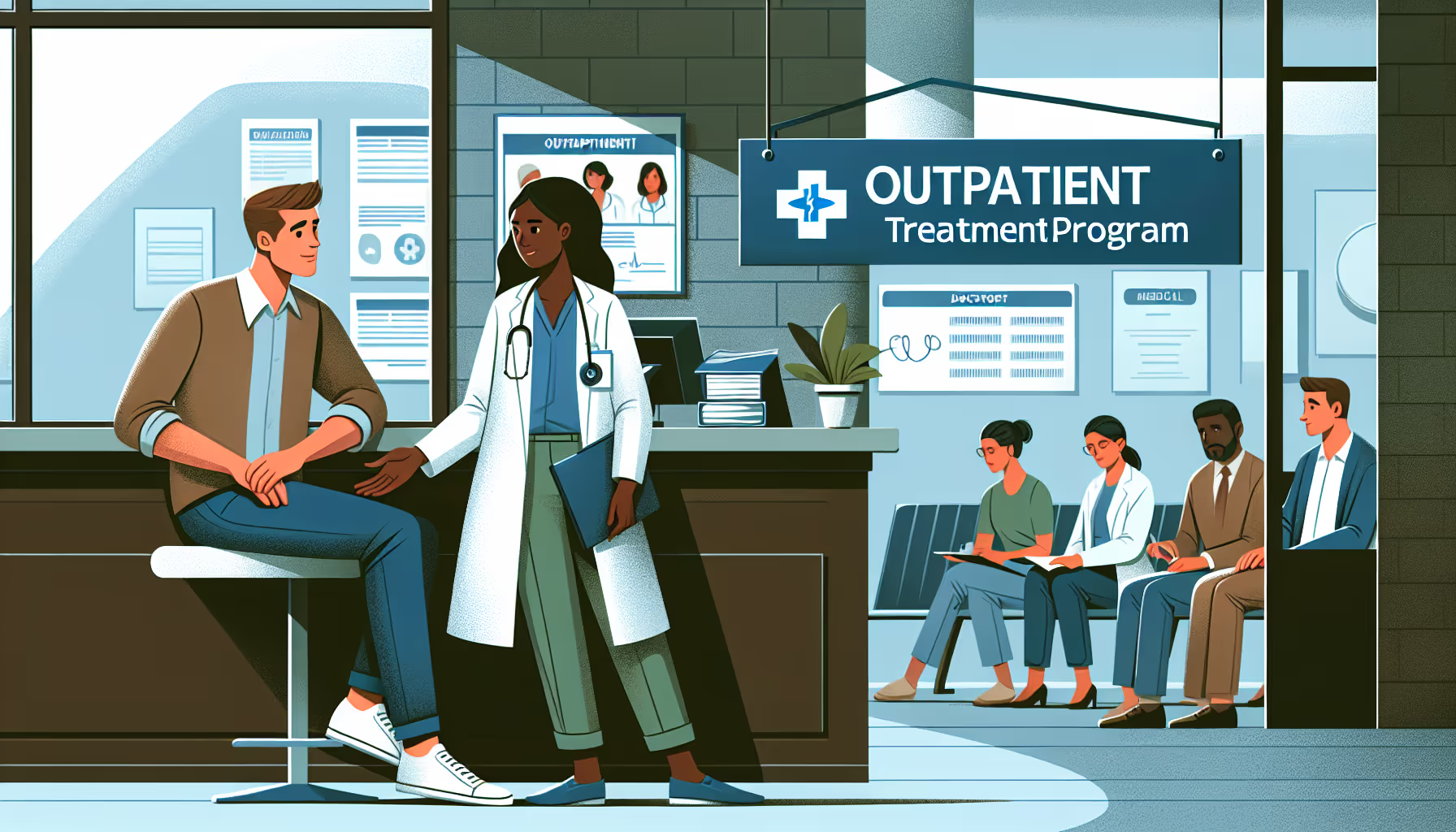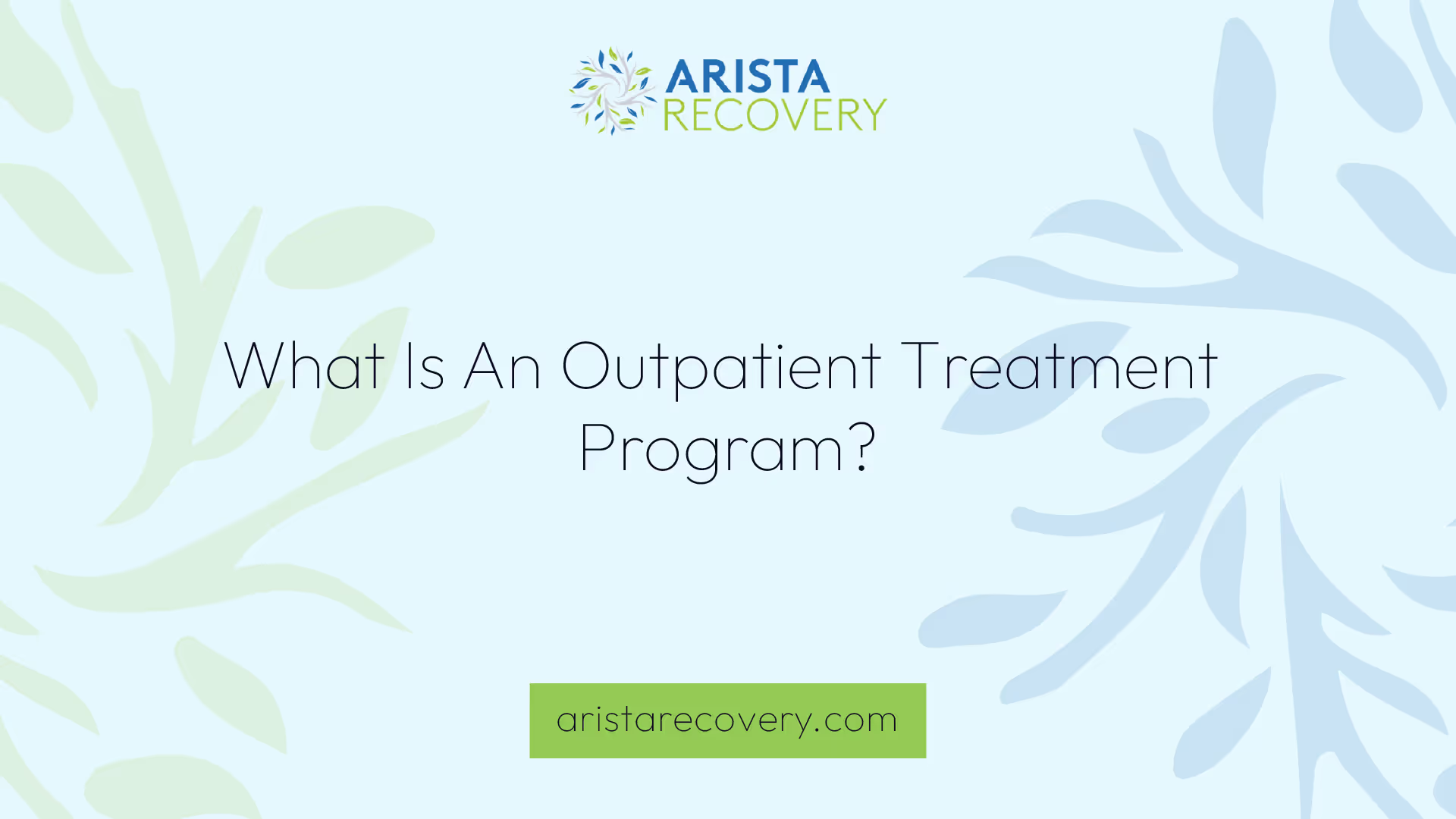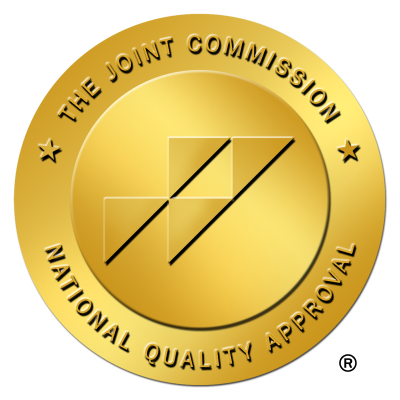What Is An Outpatient Treatment Program?

Understanding Outpatient Treatment Programs
In the realm of health and recovery, various treatment programs are available to cater to different needs. One such program is outpatient treatment, which offers a unique approach to healing and recovery.

Defining Outpatient Treatment
So, what is an outpatient treatment program? According to SAMHSA, outpatient treatment programs do not require participants to reside in a treatment facility. Instead, they allow individuals to attend therapy sessions while still living at home. These types of treatment programs provide individuals with the flexibility to continue working, attending school, and fulfilling family obligations while receiving treatment for issues like substance abuse.
Outpatient treatment programs are suitable for individuals who do not require detoxification or 24-hour supervision but still need support and structure in their recovery journey. These programs are also beneficial for individuals transitioning from inpatient treatment, providing continued care and support as they reintegrate into their daily lives [1].
Types of Outpatient Treatment
Outpatient treatment programs come in various forms, offering different levels of care tailored to meet the individual's specific needs. Here are two common types of outpatient treatment programs:
- Partial Hospitalization Programs (PHP): These programs provide the highest level of outpatient care. They are ideal for individuals who require a high level of support but do not need round-the-clock supervision.
- Intensive Outpatient Programs (IOP): IOPs offer a lower level of care compared to PHPs but still provide a structured treatment approach. These programs are suitable for individuals who require ongoing support as they transition back into their daily routines.
Both PHP and IOP offer a structured environment where individuals can receive therapy, learn coping strategies, and get the support they need to manage their conditions effectively. By understanding these types of outpatient treatment programs, individuals can make informed decisions about the best approach to their recovery journey.
Benefits of Outpatient Treatment
Outpatient treatment programs offer a host of benefits to individuals seeking recovery from substance abuse. These programs are designed to provide comprehensive care while allowing participants to maintain their daily routines. Here, we explore some of the key advantages of outpatient treatment programs.
Flexibility and Daily Life
One of the significant benefits of outpatient treatment programs is their flexibility. These programs provide individuals with the ability to continue working, attending school, and fulfilling family obligations while receiving treatment for substance abuse. This flexibility can be particularly beneficial for those who cannot commit to a full-time residential program due to work, family, or other responsibilities.
Outpatient treatment programs provide flexibility in scheduling, making them accessible for individuals who cannot commit to full-time residential programs due to personal or professional obligations [3].
Affordability Aspect
Another benefit of outpatient treatment programs is their affordability. Unlike residential treatment programs, outpatient programs do not require participants to pay for room and board, making them a more cost-effective option for many individuals. Additionally, many insurance companies cover outpatient treatment, further reducing out-of-pocket expenses.
Real-Life Application
Outpatient treatment programs offer the benefit of real-life application. By allowing participants to continue with their regular routines, these programs provide opportunities for individuals to apply the skills and strategies learned in therapy in real-world settings. This can be particularly helpful in reinforcing new behaviors and promoting long-term recovery.
Further, outpatient treatment programs provide individuals with the support and guidance they need to navigate the challenges of daily life while managing their recovery. Participants can attend therapy sessions, counseling, and medication management while still fulfilling work, school, or family obligations. This makes it easier for individuals to maintain their normal daily routines while receiving treatment for addiction.
In conclusion, outpatient treatment programs offer a flexible, affordable, and practical approach to addiction recovery. These programs provide the support and treatment necessary for recovery while allowing individuals to continue with their daily activities, making them an ideal choice for many individuals.
Structure of Outpatient Treatment Programs
Understanding the structure of outpatient treatment programs can provide a clearer picture of what to expect from such a program. These programs comprise varying levels of care, include different types of therapies, and have a typical duration, all of which are designed to support the patient's journey to recovery.
Levels of Care in Outpatient Treatment
Outpatient treatment programs offer various levels of care tailored to meet the individual's specific needs. These typically include Partial Hospitalization Programs (PHP) and Intensive Outpatient Programs (IOP). The level of care provided is determined based on the severity of the patient's condition and their unique recovery needs.
Various Therapies Involved
Outpatient treatment programs typically include a range of therapies to promote long-term recovery and sobriety. These may include individual counseling, group therapy, educational sessions, and access to support groups.
Different types of therapy, such as cognitive-behavioral therapy (CBT) and dialectical behavioral therapy (DBT), may be utilized, along with a long-term relapse prevention plan. Some patients may also participate in the 12-step program for recovery during outpatient treatment.
In some instances, outpatient treatment programs may also provide specialized services, such as family therapy, medication management, holistic therapy options, and specialized programs for certain populations, ensuring comprehensive care and support.
Duration of Outpatient Treatment
The duration of outpatient treatment programs can vary significantly based on the individual's specific needs and progress. However, the treatment program usually lasts at least 90 days. This period is aimed at identifying the root cause of addiction and mental health issues to achieve long-term sobriety and a fulfilling life [5].
It's important to note that the duration of treatment can be extended if necessary, based on the patient's progress and ongoing needs. Ultimately, the goal of an outpatient treatment program is to equip individuals with the tools and strategies they need to maintain their recovery long after they've completed the program.
Who Can Benefit from Outpatient Programs?
The benefits of outpatient treatment programs can be far-reaching, catering to a variety of individuals with different needs and circumstances. The suitability of these programs largely depends on the individual's condition, the severity of their addiction, their living environment, and their willingness to recover.
Ideal Candidates for Outpatient Treatment
Outpatient treatment programs are suitable for individuals who do not require detoxification or 24-hour supervision but still need support and structure in their recovery journey. Ideal candidates for outpatient treatment are those with stable living conditions, a lower risk of severe withdrawal symptoms, minimal drug relapse history, and a willingness to recover from drug addiction [5].
These programs are also suitable for individuals with milder forms of alcohol abuse or for those who have completed inpatient rehabilitation but require ongoing support and therapy to maintain their recovery from alcohol addiction.
In addition, outpatient treatment programs can be a good fit for individuals with a commitment to recovery, a stable living environment, and a mild to moderate addiction [8].
Transition from Inpatient to Outpatient
For individuals who have completed a residential treatment program, transitioning to an outpatient treatment program can be an effective next step. Outpatient programs serve as a continuum of care that can offer structured support and therapy while individuals maintain their daily routines and responsibilities [6].
This transition allows individuals to continue receiving the necessary therapy and support while reintegrating into their daily lives. This can help them to apply the skills and strategies learned during residential treatment in real-world settings, which can be crucial for long-term recovery.
In conclusion, while outpatient treatment programs may not be suitable for everyone, they can be an instrumental resource for many individuals in their recovery journey. By assessing their own needs, circumstances, and readiness for recovery, individuals can determine if an outpatient program is the right choice for their path towards sobriety.
Risks and Limitations of Outpatient Treatment
Despite the numerous benefits of outpatient treatment programs, it's important to understand that they may not be an ideal solution for everyone. There are certain limitations and considerations that should be taken into account when deciding whether to opt for an outpatient treatment program.
Limitations of Outpatient Programs
Outpatient treatment programs may not be appropriate for individuals with severe addiction issues, unstable living situations, or those who need more intensive care and supervision. These programs are typically designed to cater to individuals who are able to manage their recovery while continuing with their daily responsibilities such as work or school.
However, individuals with more severe addictions may require the round-the-clock care and supervision provided by inpatient programs. Additionally, those with unstable living situations might not be in the right environment to support their recovery if they opt for an outpatient program.
Outpatient treatment programs also require a significant amount of self-discipline and commitment from the individual. The success of these programs largely depends on the individual's ability to adhere to the treatment plan, attend all scheduled therapy sessions and counseling, and resist the temptations that might be present in their daily environment.
Considerations for Choosing Outpatient Treatment
When considering whether to opt for an outpatient treatment program, it's important to assess the severity of the addiction, the individual's living situation, their level of commitment to recovery, and their ability to manage their recovery while continuing with their daily responsibilities.
It's also important to consider the individual's personal and professional obligations. For some people, the flexibility offered by outpatient treatment programs allows them to receive the necessary treatment while still being able to fulfill their responsibilities at work, school, or home. This can be particularly beneficial for those who cannot commit to a full-time residential program.
However, it's important to remember that the success of outpatient treatment largely depends on the individual's commitment to their recovery. It requires a significant amount of self-discipline to adhere to the treatment plan and resist the temptations that may be present in their daily environment.
Lastly, it's worthwhile to consider the duration of the outpatient treatment. This can vary depending on several factors, including the individual's needs, their progress, and the structure of the program. In some cases, the duration of outpatient treatment can be adjusted based on the individual's needs.
In conclusion, while outpatient treatment programs offer several benefits, they also have certain limitations. It's important for individuals to carefully consider these factors and consult with a healthcare professional before deciding on the best course of treatment.
Additional Services in Outpatient Treatment
Outpatient treatment programs are not just about addressing the immediate health issue, be it substance abuse or mental health disorders. They incorporate additional services that provide a holistic approach to treatment and recovery, focusing on the overall well-being of the individual. These additional services include various types of therapy, wellness programs, and family involvement.
Holistic Approaches in Outpatient Programs
Outpatient treatment programs often offer ancillary services such as mental health counseling, group therapy, vocational counseling, and wellness programs. These services aim to address the individual's overall well-being and recovery needs, providing a comprehensive approach to treatment [4].
Holistic therapy options might be available, focusing on healing the person as a whole rather than just addressing the specific disorder or problem. This can include services like individual counseling, group therapy, educational sessions, and access to support groups to promote long-term recovery and sobriety.
Some outpatient programs may also integrate a long-term relapse prevention plan and the 12-step program for recovery as part of their comprehensive approach.
Family Involvement and Counseling
Family involvement is a crucial component of many outpatient treatment programs. Recognizing the role of the family in an individual's recovery process, these programs often offer family therapy and counseling. This not only helps the family members understand the nature of the disorder or addiction but also equips them with the knowledge and tools to provide the necessary support at home.
In addition to family counseling, outpatient treatment programs may also involve individual therapy, group therapy, medication management, and other services tailored to the individual's needs. This comprehensive approach ensures that patients receive the necessary care and support while allowing them to continue their work or school obligations.
Through these additional services, outpatient treatment programs aim to provide a comprehensive and holistic approach to recovery, addressing not just the immediate health concern but also the underlying issues and the individual's overall well-being. This is what makes outpatient treatment programs an effective option for many individuals seeking treatment for substance abuse or mental health disorders.
References
[1]: https://www.cwcrecovery.com/blog/outpatient-treatment-programs/
[2]: https://www.urbanrecovery.com/blog/how-long-does-outpatient-treatment-last
[3]: https://www.addictioncenter.com/treatment/inpatient-outpatient-rehab/
[4]: https://www.sanantoniorecoverycenter.com/rehab-blog/what-are-the-benefits-of-an-outpatient-treatment-program/
[5]: https://www.aquilarecovery.com/blog/what-is-considered-outpatient-treatment/
[6]: https://waypointrecoverycenter.com/blog/how-long-outpatient-program/
[7]: https://www.alcoholrehabguide.org/treatment/benefits-outpatient-rehab/
[8]: https://www.sanantoniorecoverycenter.com/rehab-blog/inpatient-vs-outpatient/


